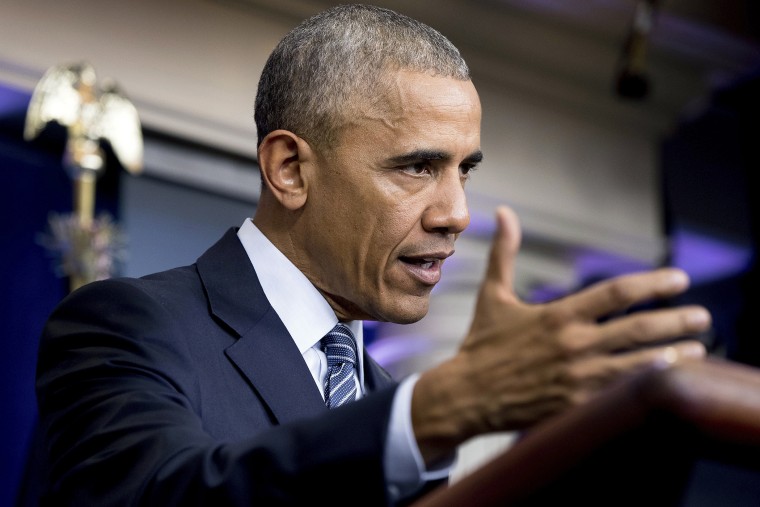President Obama will wrap up his second term next month, leaving him limited opportunities for major, big-picture speeches. As was clear in Tampa yesterday, however, Obama is eager to take advantage of his remaining time in office to speak to his legacy -- and his successor. Slate's Fred Kaplan helped set the stage:
President Obama on Tuesday delivered his final national security speech as commander in chief. The address had been planned well before the election, his deputy national security adviser, Ben Rhodes, had told reporters in advance. The intention was to summarize the things the president had accomplished and the guidelines that the next one, whoever he or she might be, would be wise to follow in the year ahead.But the unmistakable subject of the speech Obama gave in front of a crowd of servicemen and women at MacDill Air Force Base in Tampa, Florida, was the man he never actually named, Donald Trump.
If you missed the speech, the transcript is online, and if you read it, pay particular attention to the repeated instances in which Obama sent not-so-subtle shots across his successor's bow.* On torture: "We prohibited torture, everywhere, at all times -- and that includes tactics like waterboarding. And at no time has anybody who has worked with me told me that doing so has cost us good intelligence. (Applause.) When we do capture terrorists, despite all the political rhetoric about the need to strip terrorists of their rights, our interrogation teams have obtained valuable information from terrorists without resorting to torture, without operating outside the law."* On civil liberties: "[W]e have to uphold the civil liberties that define us. Terrorists want us to turn on one another.... The United States of America is not a country that imposes religious tests as a price for freedom."* On Muslims: "We are fighting terrorists who claim to fight on behalf of Islam. But they do not speak for over a billion Muslims around the world, and they do not speak for American Muslims, including many who wear the uniform of the United States of America's military. If we stigmatize good, patriotic Muslims, that just feeds the terrorists' narrative. It fuels the same false grievances that they use to motivate people to kill. If we act like this is a war between the United States and Islam, we're not just going to lose more Americans to terrorist attacks, but we'll also lose sight of the very principles we claim to defend."* On American principles: "[O]ver these last eight years, we have demonstrated that staying true to our traditions as a nation of laws advances our security as well as our values.... We can get these terrorists and stay true to who we are."* On the terrorist threat: "Today's terrorists can kill innocent people, but they don't pose an existential threat to our nation, and we must not make the mistake of elevating them as if they do. That does their job for them. It makes them more important and helps them with recruitment."* On dissent: "We're a nation that believes freedom can never be taken for granted and that each of us has a responsibility to sustain it. The universal right to speak your mind and to protest against authority, to live in a society that's open and free, that can criticize a president without retribution."That last one, by the way, sparked quick and hearty applause from Obama's audience.The president didn't mention his successor's name, but he didn't have to. On each of these points, Donald Trump believes -- or at least has said he believes -- the exact opposite of the principles Obama outlined yesterday. Trump embraces torture, sees value in divisiveness, wants to treat a religious minority as inherently suspect, exaggerates the terrorist threat, and believes criticism of a president (or in this case, a president-elect) is grounds for a tantrum in the form of angry tweets.In other words, yesterday was about Obama's desire to create a contrast between two very different visions -- one that works vs. one that doesn't -- in the hopes that his successor might learn to value the former over the latter. There's inherent danger, the president explained, in pursuing the wrong course.Vox's Zack Beauchamp concluded, "This isn't the first time a president has left office by warning of a threat inside America -- think of George Washington's farewell speech advising against 'entangling alliances,' or Dwight Eisenhower coining the now-famous term 'military-industrial complex' in his closing speech. But it's one thing for such a warning to be directed at an abstract concept -- and quite another for it to be directed at the 45th president of the United States."
